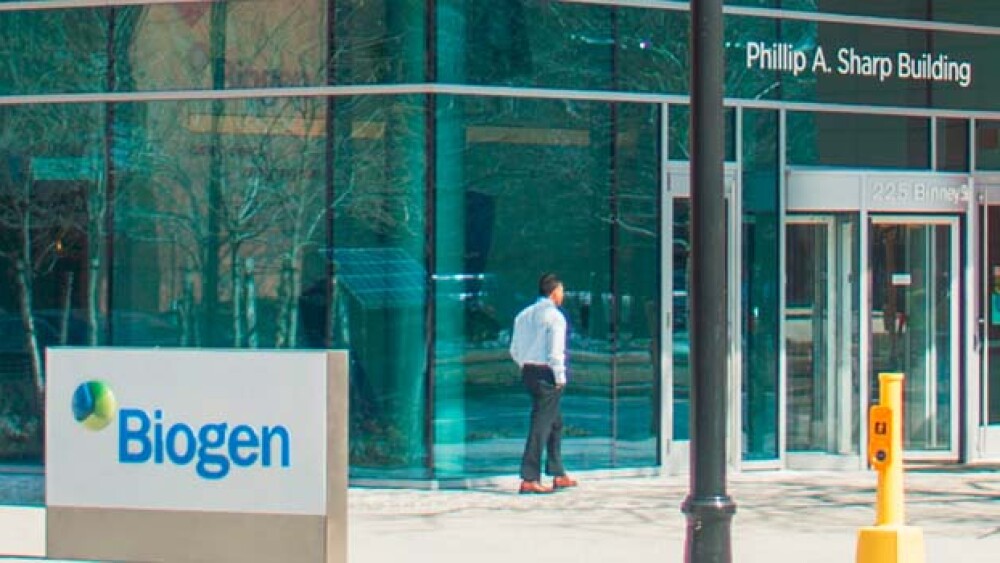As Biogen stays in the hunt for an Alzheimer’s treatment with the recent presentation of data about aducanumab made at the 12th Clinical Trials on Alzheimer’s Disease (CTAD) conference on December 5, it’s expanding its pipeline.
As Biogen stays in the hunt for an Alzheimer’s treatment with the recent presentation of data about aducanumab made at the 12th Clinical Trials on Alzheimer’s Disease (CTAD) conference on December 5, it’s expanding its pipeline.
Ionis Pharmaceuticals, based in Carlsbad, California, announced it had licensed its IONIS-MAPTRX to Biogen. The product is an antisense therapy that selectively decreases the production of microtubule-associated protein tau (MAPT) in the central nervous system. Tau is one of two major proteins associated with Alzheimer’s disease, the other being beta-amyloid. Beta-amyloid is the target of Biogen’s aducanumab.
Amyloid appears throughout the disease, but tau typically shows up in tangles later in the disease. Tau is also implicated in other diseases, so-called tauopathies, including chronic traumatic encephalopathy (CTE), frontotemporal dementia, parkinsonism, progressive supranuclear palsy (PSP) and others.
Interestingly, on December 13, Biogen announced topline data from its Phase II PASSPORT trial of gosuranemab for PSP. The trial failed to meet its primary endpoint or key clinical secondary endpoints. As a result, it announced it was shutting down its gosuranemab program for PSP and other primary tauopathies.
At the time, Alfred Sandrock, Biogen’s executive vice president, R&D and chief medical officer, said, “We remain unwavering in our commitment to advancing therapies that have the potential to address the significant unmet medical needs of people with neurodegenerative diseases who are faced with limited to no treatment options.”
In preclinical research, IONIS-MAPTRX showed prevention and reversal of pathology associated with tau.
Under the terms of the deal, Biogen paid Ionis $45 million upfront. Ionis is eligible for up to $155 million in additional milestone payments as well as royalties in the low- to mid-teens on any eventual sales, if any. Ionis will handle the Phase I study of the therapy in mild Alzheimer’s patients that was launched in 2017 and a one-year long-term extension trial that started this year. Biogen will handle all further studies and development, including regulatory filings and commercialization.
“The licensing of IONIS-MAPTRX currently in a Phase I clinical study in mild AD patients, is an important milestone for the program,” said Brett P. Monia, Ionis’ chief operating officer. “It brings us another step closer to potentially delivering a therapy to patients who have few or no effective treatment options.”
This partnership is a continuation of other collaborations between the two companies. Biogen’s Spinraza for spinal muscular atrophy (SMA) came out of their partnership. The two companies are also working to develop BIIB067 (tofersen) for amyotrophic lateral sclerosis (ALS), which Biogen licensed from Ionis in 2018, as well as IONIS-C9Rx (BIIB078) for ALS, and ION859, for Parkinson’s disease.
In late-November, Akcea Therapeutics, a majority-owned affiliate of Ionis, along with Ionis, initiated the NEURO-TTRansform Phase III trial of AKCEA-TTR-LRX in polyneuropathy caused by hereditary TTR amyloidosis (hATTR amyloidosis). AKCEA-TTR-LRX is an antisense drug developed with Ionis’s Ligand Conjugated Antisense (LICA) technology platform. It inhibits production of TTR.
hATTR amyloidosis is a severe, progressive, life-threatening disease caused by the abnormal accumulation of the TTR protein and aggregation of TTR amyloid deposits in tissues and organs, including the peripheral nerves, heart and intestine. This can lead to nerve pain and cardiomyopathy.
Antisense therapeutics are developed for diseases with a known gene abnormality. They involve synthesizing a strand of DNA or RNA that will bind to the messenger RNA (mRNA) produced by the gene. It essentially binds and turns the gene off.





